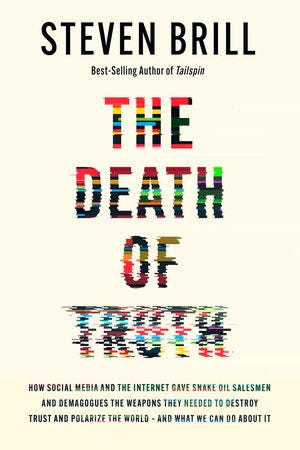Is Programmatic Advertising a Threat to Democracy?
Tl;dr: YUP.
This week, we’re talking:
How programmatic advertising is harming journalism and democracy 📰 🔥
Why the CEO of Zoom thinks we should all clone ourselves with AI 🤖 👯
What is “right to warn” and why are ex-OpenAI staffers insisting on it 🚨 🚨
What AI Overview means for publishers and how they’re fighting back 🦾📝
Google’s Chief Privacy Officer is out, nobody seems to know why 🔐 🗑
Forget what anybody says, SF is on the rise 💼 🌉
Why my brother thinks he’s 10x smarter than me (video) 🧠 ✖ 🔟
My Take:
What do GEICO, Best Buy & Progressive Insurance have in common? In 2019, they all financed a propaganda machine of Vladimir Putin’s Kremlin: Sputnik News. They didn't do it intentionally. It's a result — and an all too common one — of programmatic advertising.
I was in the boiler room of the data-driven, programmatic advertising wave that overtook digital media in the mid- to late 00's. Krux, the company I headed at the time, was the data management system that brands and publishers used to interoperate with programmatic advertising systems from companies called SSP's (supply-side platforms) and DSP's (demand-side platforms) at the time. All of them died; only two, Google and The Trade Desk, are still standing.
I used to crow on stages about the 3.5 *BILLION* unique users per month Krux's infrastructure served. What I didn't talk about so much was this: it was increasingly clear that a lot of those 'uniques' were bots that were clicking on ads posted by low-value publishers who were milking the programmatic wave for money.
In his new book, The Death of Truth, journalist Steven Brill writes that:
“Programmatic advertising has thrived based on the central belief that all impressions aimed at the right target are equally valuable. So, if Sputnik News is selling an impression for less than a legitimate local newspaper is asking for it, Sputnik will win the auction. It’s a perpetual, instantaneous race to the bottom. If the bid for an impression on the Santa Monica Observer—a hoax website that ran a phony story about Nancy Pelosi’s husband, Paul, being with a male prostitute when he was brutally attacked last year—is lower than the bid offered for an ad on an article that tells the real story of what happened to Pelosi published by the San Francisco Chronicle, which pays real reporters to write real stories, then Hertz’s ad will be on the Observer story. As, indeed, it was.”
We've come to understand how social media platforms leverage poisonous recommendation algorithms to foment insurrection and misinformation. What's less discussed is how websites that advance misinformation chew up economics under the dark of night from high-value publishers who are still fighting to bring us fact-based news.
A Comscore analysis from 2021 concluded that programmatic advertising was feeding publishers of misinformation and disinformation to the tune of $2.6billion/year. Hard-hitting journalism, meanwhile, starves to the brink of extinction.
The net result: A highly efficient machine for propagating misinformation and directing money into the pockets of our adversaries. A machine that pollutes our mammalian brains, already pre-wired for outrage. A machine that imperils the journalistic institutions we depend on for facts and truth, and thereby subverts liberal democracy -- which is already on the bubble, now especially as we go into an American election with a Presidential candidate who's also a convicted felon.
What could go wrong? Everything.
Totally Unpaid for Promotion:
We do one on every episode of the{Closed}session podcast and it seemed high time to bring it to Substack. This week’s totally unpaid for promotion is Steven Brill’s aforementioned book, The Death of Truth.
How did we become a world where facts—shared truths—have lost their power to hold us together as a community, as a country, globally? How have we allowed the proliferation of alternative facts, hoaxes, even conspiracy theories, to destroy our trust in institutions, leaders, and legitimate experts? Best-selling journalist Steven Brill documents the forces and people, from Silicon Valley to Madison Avenue to Moscow to Washington, that have created and exploited this world of chaos and division—and offers practical solutions for what we can do about it.
“A precise description of the punishment cell we have built around our minds and the first few steps back towards light and air.” –Timothy Snyder, Author of On Tyranny and Professor of History, Yale University
“A seminal, ground-breaking, documented and honest examination of two of the central dilemmas of our time—what is truth and where to find it.” —Bob Woodward, associate editor at The Washington Post
What I’m Reading:
The CEO of Zoom wants AI clones in meetings by Nilay Patel VIA The Verge 🤖 👯
He thinks one of the big benefits of AI at work will be letting us all create something he calls a ‘digital twin’ — essentially a deepfake avatar of yourself that can go to Zoom meetings on your behalf and even make decisions for you while you spend your time on more important things, like your family.
Ex-OpenAI staff call for “right to warn” about AI risks without retaliation by Benj Edwards VIA arsTECHNICA 🚨🚨
A group of former OpenAI and Google DeepMind employees published an open letter calling for AI companies to commit to principles allowing employees to raise concerns about AI risks without fear of retaliation. The letter, titled "A Right to Warn about Advanced Artificial Intelligence," has so far been signed by 13 individuals, including some who chose to remain anonymous due to concerns about potential repercussions.
Google’s A.I. Search Leaves Publishers Scrambling by Nico Grant and Katie Robertson VIA NYTimes 🦾 📝
Publishers said in interviews that it was too early to see a difference in traffic from Google since AI Overviews arrived. But the News/Media Alliance, a trade group of 2,000 newspapers, has sent a letter to the Justice Department and the Federal Trade Commission urging the agencies to investigate Google’s “misappropriation” of news content and stop the company from rolling out AI Overviews.
super{set} Moves to New Global HQ in Downtown San Francisco VIA SFChronicle & SFExaminer 💼 🌉
Chavez said it’s good for his business to be downtown with so much artificial-intelligence activity happening in the area. He also said he has loved San Francisco since becoming a resident nearly 30 years ago, and he is glad to be part of the local “renaissance” he sees underway. “We believe in San Francisco,” Chavez said. “We know it’s on the rise, and I know that there will be a lot of other companies and people coming here to this area very, very soon. I already see them on the street.”
Google's Chief Privacy Officer Announces Sudden Departure Amid Leaked Internal Privacy Documents by Emily Reila VIA Entrepreneur 🔐 🗑
The company does not plan to replace Enright, and many took the news of his exit as "a shock." Enright's departure comes at a contentious time for the company's security and legal departments. Earlier this week, an internal Google database that tracked privacy and security issues leaked to 404 Media, showing a slew of problems that were hidden from the public for over six years, including Google making YouTube recommendations based on deleted watch history and Google Street View accidentally reading and storing thousands of car license plate numbers.
Meme of the Week:
Come work with me!
Apply to super{set} VECTOR
A 12-week fully-paid launchpad for technical product leaders to receive direction, build magnitude, and co-explore company creation alongside super{set} - Apply at superset.com/vector






